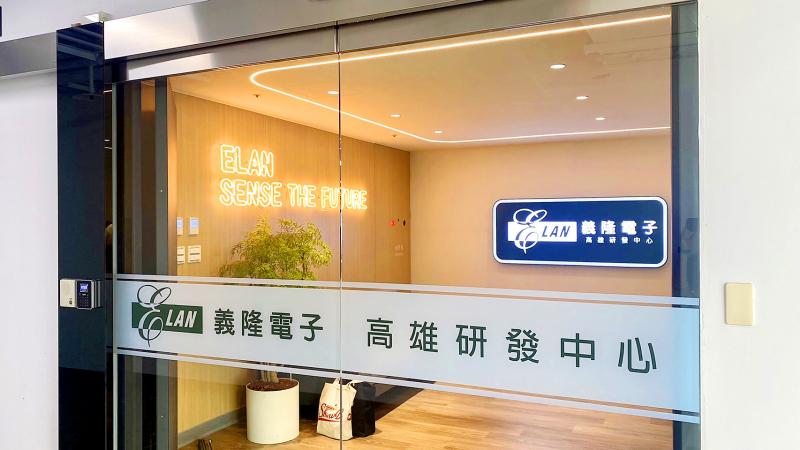Elan Microelectronics Corp (義隆電子), which designs chips used in PC touch pads and touch screens, yesterday said revenue would plummet about 30 percent sequentially this quarter as customers scale back orders due to sagging computer demand and excess inventory.
The company said growth momentum for commercial notebook computers began to ebb in the second half of this year, as enterprises cut spending amid soaring inflation and economic headwinds.
As customers are stepping up efforts to reduce channel inventory, especially touch pads used in Chromebooks, the overall inventory level is expected to return to normal in the first half of next year, Elan said.

Photo: Wang Jung-hsiang, Taipei Times
Sales of Chromebooks more than halved to 6 million units last quarter from 12.3 million units a year earlier, International Data Corp data showed.
“The sales of notebook computers fell short of our expectations due to sagging market demand amid macroeconomic [uncertainties],” Elan spokesman Dennis Liu (劉代銘) said. “All products lines are to see quarterly declines during the third quarter, with touch screen sales taking a bigger hit.”
Elan is conservative about this quarter’s revenue outlook, expecting sales of between NT$2.8 billion and NT$3 billion (US$93.35 million and US$100 million), representing a decline of 27.71 to 32.53 percent from NT$4.15 billion last quarter.
The fourth quarter would be better as customers’ demand recovers, Elan said, adding that it could revise its outlook given shorter order visibility and dynamic market changes.
Commenting on the escalating tensions across the Taiwan Strait, Liu said any geopolitical tensions or war would have an enormous impact on supply chains and the scale would be global as Taiwan and China supply most of the world’s consumer electronics.
This quarter, gross margin is likely to stay between 46 and 48 percent, compared with 47.5 percent last quarter, thanks to higher shipments of better high-margin products, such as haptic touchpads, which sell for up to 10 times as much as conventional products, Elan said.
There is a slim chance that customers would cut prices, given higher material and manufacturing costs, Elan chairman Yeh I-hau (葉儀皓) said.
Foundry costs have remained high, with only one Chinese foundry service provider cutting prices to previous levels, he said.
Elan reported that net profit last quarter dropped 1.75 percent quarterly and more than 40 percent annually to NT$761 million due to slumping demand for Chromebooks. That marked the weakest quarterly profit in about nine quarters.
Earnings per share dropped to NT$2.75 from NT$2.81 in the first quarter and NT$4.53 a year earlier.

Taiwan Semiconductor Manufacturing Co (TSMC, 台積電), the world’s biggest contract chipmaker, booked its first-ever profit from its Arizona subsidiary in the first half of this year, four years after operations began, a company financial statement showed. Wholly owned by TSMC, the Arizona unit contributed NT$4.52 billion (US$150.1 million) in net profit, compared with a loss of NT$4.34 billion a year earlier, the statement showed. The company attributed the turnaround to strong market demand and high factory utilization. The Arizona unit counts Apple Inc, Nvidia Corp and Advanced Micro Devices Inc among its major customers. The firm’s first fab in Arizona began high-volume production

VOTE OF CONFIDENCE: The Japanese company is adding Intel to an investment portfolio that includes artificial intelligence linchpins Nvidia Corp and TSMC Softbank Group Corp agreed to buy US$2 billion of Intel Corp stock, a surprise deal to shore up a struggling US name while boosting its own chip ambitions. The Japanese company, which is adding Intel to an investment portfolio that includes artificial intelligence (AI) linchpins Nvidia Corp and Taiwan Semiconductor Manufacturing Co (TSMC, 台積電), is to pay US$23 a share — a small discount to Intel’s last close. Shares of the US chipmaker, which would issue new stock to Softbank, surged more than 5 percent in after-hours trading. Softbank’s stock fell as much as 5.4 percent on Tuesday in Tokyo, its

SETBACK: Apple’s India iPhone push has been disrupted after Foxconn recalled hundreds of Chinese engineers, amid Beijing’s attempts to curb tech transfers Apple Inc assembly partner Hon Hai Precision Industry Co (鴻海精密), also known internationally as Foxconn Technology Group (富士康科技集團), has recalled about 300 Chinese engineers from a factory in India, the latest setback for the iPhone maker’s push to rapidly expand in the country. The extraction of Chinese workers from the factory of Yuzhan Technology (India) Private Ltd, a Hon Hai component unit, in southern Tamil Nadu state, is the second such move in a few months. The company has started flying in Taiwanese engineers to replace staff leaving, people familiar with the matter said, asking not to be named, as the

The prices of gasoline and diesel at domestic fuel stations are to rise NT$0.1 and NT$0.4 per liter this week respectively, after international crude oil prices rose last week, CPC Corp, Taiwan (台灣中油) and Formosa Petrochemical Corp (台塑石化) announced yesterday. Effective today, gasoline prices at CPC and Formosa stations are to rise to NT$27.3, NT$28.8 and NT$30.8 per liter for 92, 95 and 98-octane unleaded gasoline respectively, the companies said in separate statements. The price of premium diesel is to rise to NT$26.2 per liter at CPC stations and NT$26 at Formosa pumps, they said. The announcements came after international crude oil prices